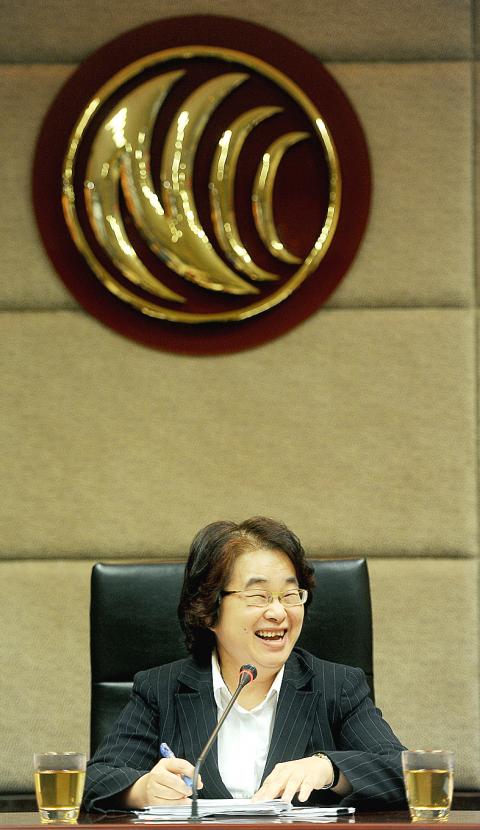The Democratic Progressive Party (DPP) yesterday reiterated its opposition to a Want Want China Times Group merger and called for President Ma Ying-jeou (馬英九) to handle the deal appropriately.
“The DPP, which has always advocated the freedom of the press and social justice, calls for the Chinese Nationalist Party [KMT] to express its position on the case and for Ma to handle the case with care,” DPP spokesperson Wang Min-sheng (王閔生) told a press conference.
The conditional approval of a NT$76 billion (US$2.52 billion) deal allowing Want Want China Times Group to acquire cable television service provider China Network Systems (CNS) has drawn widespread criticism over fears a media monopoly could be created.

Photo: Liu Hsin-de, Taipei Times
Citing reports of international media, including the BBC, The Associate Press and the UK-based Financial Times, Wang said the deal was now in the international spotlight with various media outlets having reported on Want Want China Times Group chairman Tsai Eng-meng’s (蔡衍明) pro-China position, China’s increasing influence on Taiwanese media and the self-censorship of local media on Beijing’s rights violations and corruption.
Despite strong opposition against the deal from academics and civic groups, members of the National Communications Commission (NCC) still approved the deal with less than one week left on their terms on the commission, Wang said, adding that what was even more incredible was that Want Want Group then reneged on the details of the deal less than 24 hours after the deal was approved.
Hung Chih-kun (洪智坤), a member of the DPP’s Central Executive Committee, yesterday launched a boycott of the media conglomerate following a concerted attack by the group’s electronic and print media outlets on those who have publicly voiced opposition to the merger, including Huang Kuo-chang (黃國昌), a researcher at Academia Sinica.
The group’s vicious attack is no different to the kind of thing thugs would do, Hung said, adding that he was launching a boycott of politicians, writers and academics to refuse to write for the media group or to be interviewed or quoted by the its media operations.

Chinese Nationalist Party (KMT) Chairman Eric Chu (朱立倫), spokeswoman Yang Chih-yu (楊智伃) and Legislator Hsieh Lung-chieh (謝龍介) would be summoned by police for questioning for leading an illegal assembly on Thursday evening last week, Minister of the Interior Liu Shyh-fang (劉世芳) said today. The three KMT officials led an assembly outside the Taipei City Prosecutors’ Office, a restricted area where public assembly is not allowed, protesting the questioning of several KMT staff and searches of KMT headquarters and offices in a recall petition forgery case. Chu, Yang and Hsieh are all suspected of contravening the Assembly and Parade Act (集會遊行法) by holding

PRAISE: Japanese visitor Takashi Kubota said the Taiwanese temple architecture images showcased in the AI Art Gallery were the most impressive displays he saw Taiwan does not have an official pavilion at the World Expo in Osaka, Japan, because of its diplomatic predicament, but the government-backed Tech World pavilion is drawing interest with its unique recreations of works by Taiwanese artists. The pavilion features an artificial intelligence (AI)-based art gallery showcasing works of famous Taiwanese artists from the Japanese colonial period using innovative technologies. Among its main simulated displays are Eastern gouache paintings by Chen Chin (陳進), Lin Yu-shan (林玉山) and Kuo Hsueh-hu (郭雪湖), who were the three young Taiwanese painters selected for the East Asian Painting exhibition in 1927. Gouache is a water-based

Taiwan would welcome the return of Honduras as a diplomatic ally if its next president decides to make such a move, Minister of Foreign Affairs Lin Chia-lung (林佳龍) said yesterday. “Of course, we would welcome Honduras if they want to restore diplomatic ties with Taiwan after their elections,” Lin said at a meeting of the legislature’s Foreign Affairs and National Defense Committee, when asked to comment on statements made by two of the three Honduran presidential candidates during the presidential campaign in the Central American country. Taiwan is paying close attention to the region as a whole in the wake of a

OFF-TARGET: More than 30,000 participants were expected to take part in the Games next month, but only 6,550 foreign and 19,400 Taiwanese athletes have registered Taipei city councilors yesterday blasted the organizers of next month’s World Masters Games over sudden timetable and venue changes, which they said have caused thousands of participants to back out of the international sporting event, among other organizational issues. They also cited visa delays and political interference by China as reasons many foreign athletes are requesting refunds for the event, to be held from May 17 to 30. Jointly organized by the Taipei and New Taipei City governments, the games have been rocked by numerous controversies since preparations began in 2020. Taipei City Councilor Lin Yen-feng (林延鳳) said yesterday that new measures by